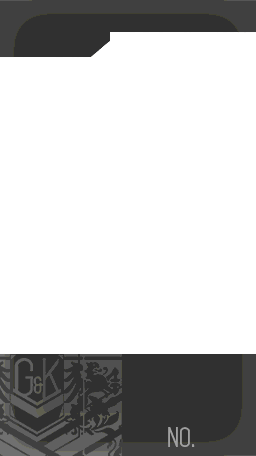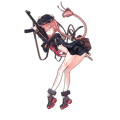Ranking of this Doll's specs relative to other Dolls of the same type.
PPS-43: Difference between revisions
mNo edit summary |
No edit summary |
||
| (3 intermediate revisions by 2 users not shown) | |||
| Line 11: | Line 11: | ||
|fullname = Pistolet-pulemyot Sudaeva 1943 | |fullname = Pistolet-pulemyot Sudaeva 1943 | ||
|voiceactor = {{voice actor name|Uesaka Sumire}} | |voiceactor = {{voice actor name|Uesaka Sumire}} | ||
|releasedon = {{doll_server_alias|server=CN|alias=PPS-43}}, {{doll_server_alias|server=TW|alias=PPS-43}}, {{doll_server_alias|server=KR|alias=PPS-43}}, {{doll_server_alias|server=EN|alias=PPS-43}}, {{doll_server_alias|server=JP|alias=PPS-43}} | |releasedon = {{doll_server_alias|server=CN|alias=PPS-43|year=2016|month=5}}, {{doll_server_alias|server=TW|alias=PPS-43}}, {{doll_server_alias|server=KR|alias=PPS-43}}, {{doll_server_alias|server=EN|alias=PPS-43}}, {{doll_server_alias|server=JP|alias=PPS-43}} | ||
| weaponinfo = The PPS (Russian: ППС - "Пистолет-пулемёт Судаева" or "Pistolet-pulemyot Sudaeva", in English: " | |weaponinfo = | ||
The PPS and its variants were used extensively by the Red Army during World War II and were later adopted by the armed forces of several countries of the former Warsaw Pact as well as its many African and Asian allies | The PPS (Russian: ППС - "Пистолет-пулемёт Судаева" or "Pistolet-pulemyot Sudaeva", in English: "Sudayev's submachine-gun") is a family of Soviet submachine guns chambered in 7.62×25mm Tokarev, developed by Alexei Sudayev as a low-cost personal defense weapon for reconnaissance units, vehicle crews and support service personnel. | ||
The PPS and its variants were used extensively by the Red Army during World War II and were later adopted by the armed forces of several countries of the former Warsaw Pact as well as its many African and Asian allies.<ref name = "pps wiki">[[wikipedia:PPS_submachine_gun|Wikipedia entry on PPS-43]]</ref> | |||
| design= | The PPS was created in response to the Soviet Red Army putting out a call for a compact and lightweight weapon with similar accuracy and projectile energy to the PPSh-41 submachine gun widely deployed at the time. They wanted something that was cheaper and easier to produce than the PPSh, as well as having a lower rate of fire to make the weapon more controllable. | ||
Despite Sudayev's name being on the gun, the original design was done by Lieutenant I.K. Bezruchko-Vysotsky from the Dzerzhinsky Artillery Academy, who had created two prototype submachine guns in 1942. Sudayev would use the second prototype as the base for his design. During the design phase, Sudayev placed emphasis on simplifying production and eliminating most machining operations. As a result, most of the weapon's parts were made of stamped sheet metal, eschewing things like a wooden stock in favor of a skeletal top-folding metal stock. Sudayev's cost-cutting measures reduced the number of machined components to a bare minimum, cutting down machining time by more than half, to 2.7 hours of machining instead of 7.3 hours for the PPSh-41. There were also savings of over 50% in raw steel usage, down to 6.2 kg instead of 13.9 kg, and fewer workers were required to manufacture and assemble the parts. Thanks to the improvements in production efficiency, the Soviet planners estimated that the new gun would have allowed an increase in monthly submachine gun output from 135,000 units to 350,000 weapons. | |||
The Soviet military field tested several prototype submachine guns between 26 April and 12 May 1942. While Sudayev's design received high marks from the testers, some minor improvements were proposed. Sudayev would return in July of that same year with an updated prototype, where it would beat out an updated version of the PPSh. Following this, the firearm was presented to the State Defense Committee for approval, and would be adopted into service as the PPS-42. | |||
The PPS is a blowback-operated weapon that fires from an open bolt. The bolt is cylindrical in shape and contains a spring-loaded claw extractor, which pulls the empty case out of the chamber to be ejected. The ejector is mounted at the head of the recoil spring guide rod, which runs through a hole in the bolt. The charging handle is integral to the bolt and is located on the right side, and reciprocates when firing. The PPS has a trigger mechanism that allows only fully automatic fire, and possesses a manual safety that secured against accidental discharges. When in the "safe" position (engaged by sliding a metal bar forward of the trigger guard), both the bolt and trigger are disabled. The weapon is fed from curved 35-round double-stack box magazines. They are not interchangeable with magazines used in the PPSh-41, nor can the gun use drum magazines. Unlike the earlier Shpagin submachine gun, the PPS had a pistol grip, but was not provided with a forward grip as the magazine well was intended to fulfil this role.<ref name = "pps forgotten weapons">[https://www.youtube.com/watch?v=zGGguFuFln4 Forgotten Weapons video on the PPS submachine gun]</ref> | |||
Towards the middle of 1943, some improvements were made to the PPS-42. The ventilated heat shield was integrated with the upper receiver cover, both the barrel and shoulder stock were shortened, the stock's locking mechanism was simplified, the casing ejector was moved to the head of the recoil spring guide rod, the magazine well angle was increased in the receiver in order to enhance feeding reliability and the safety was improved to block the trigger and lock the bolt in either the open or closed positions. This updated model was officially designated the PPS-43. | |||
Full scale production began in 1943, and by the end of the war some two million PPS-43 submachine guns had been produced. Despite this, the weapon never fully replaced the PPSh-41. Due to the massive investment already made in machinery for PPSh-41 production, it turned out it would have been uneconomical to completely abandon its production in favor of the PPS. Due to the oversupply of submachine guns after the war, production of the PPS in the Soviet Union ceased in 1946. The PPS remained in service with some Soviet forces until the mid-1950s. Among the last to relinquish it were crews of armored vehicles and the Naval Infantry. | |||
|design= | |||
|min_dmg= 13 | |min_dmg= 13 | ||
| Line 49: | Line 62: | ||
</gallery> | </gallery> | ||
| trivia = | |trivia = | ||
* | *PPS-43 is wearing a WWII Soviet marine uniform, and has the words 'За Сталина!/Za Stalina!' emblazoned on her cap, which stands for 'For Stalin!'. When damaged, the text will change to 'я потерял/Ya Poteryal' which means 'loss'. | ||
**Her choice of attire may be in reference to the weapon's use by the Soviet Naval Infantry. | |||
*Her chibi sleeps with eyes open in dormitory. | *Her chibi sprite sleeps with eyes open in the dormitory. | ||
*Oddly has six fingers on her right hand in her normal art. | *Oddly, she has six fingers on her right hand in her normal art. This is likely a mistake by the artist. | ||
*During Continuation War, Finnish Army captured several units of PPS-43 and began to make a copy of them. Known as KP m/44, they reworked all the features of the original PPS-43 which includes a chambering cartridge(from 7.62 Tokarev to 9mm parabellum), and capabilities to equip Suomi M31 drum magazine. | |||
*Is the younger sister of {{doll name|PPSh-41|SMG|2}}. | *Is the younger sister of {{doll name|PPSh-41|SMG|2}}. | ||
}} | }} | ||
[[Category:T-Dolls with censoring]] | [[Category:T-Dolls with censoring]] | ||
Latest revision as of 17:47, 2 August 2024
| PPS-43 | Quotes |
PPS-43 22   | |
| Gun Information | |
|---|---|
| Full name | Pistolet-pulemyot Sudaeva 1943 |
| Country of origin | Soviet Union |
| Manufacturer | Sestroretsk Tool Factory |
| Game Information | |
| Faction | Griffin & Kryuger |
| Manufactured / Revised by |
I.O.P. |
| Voice actor | Uesaka Sumire |
| Artist | 两卡车 |
| Released on | CN (2016-5), TW, KR, EN, JP |
| Chibi Animation | |
| Variant:
Click the marked area to switch between animations. For details regarding animations, please see Animations on the Wiki. | |
| View page template | |
How to obtain[edit]
NORMALHEAVY Timer 2:10:00. See T-Doll Production for details.
DROP Can be obtained from many battle stages from Chapter 2-5 onward.
REWARD Not obtained as a reward
Exclusive Equipment[edit]
There is no exclusive equipment for this T-Doll.
Union Skill[edit]
There is no union skill for this T-Doll.
Stats / Data[edit]
| 88(x1) → 176(x1) / 880(x5) | 25(x1) / 85(x5) | 20(x1) / 60(x5) |
|
| ||||||||
|
| ||||||||
| 12 | 0 | ||||||||
| 5% | 50% | ||||||||
| 15 |
Ranking of this Doll's specs relative to every other Doll.
Weapon Background[edit]
The PPS (Russian: ППС - "Пистолет-пулемёт Судаева" or "Pistolet-pulemyot Sudaeva", in English: "Sudayev's submachine-gun") is a family of Soviet submachine guns chambered in 7.62×25mm Tokarev, developed by Alexei Sudayev as a low-cost personal defense weapon for reconnaissance units, vehicle crews and support service personnel. The PPS and its variants were used extensively by the Red Army during World War II and were later adopted by the armed forces of several countries of the former Warsaw Pact as well as its many African and Asian allies.[1]
The PPS was created in response to the Soviet Red Army putting out a call for a compact and lightweight weapon with similar accuracy and projectile energy to the PPSh-41 submachine gun widely deployed at the time. They wanted something that was cheaper and easier to produce than the PPSh, as well as having a lower rate of fire to make the weapon more controllable.
Despite Sudayev's name being on the gun, the original design was done by Lieutenant I.K. Bezruchko-Vysotsky from the Dzerzhinsky Artillery Academy, who had created two prototype submachine guns in 1942. Sudayev would use the second prototype as the base for his design. During the design phase, Sudayev placed emphasis on simplifying production and eliminating most machining operations. As a result, most of the weapon's parts were made of stamped sheet metal, eschewing things like a wooden stock in favor of a skeletal top-folding metal stock. Sudayev's cost-cutting measures reduced the number of machined components to a bare minimum, cutting down machining time by more than half, to 2.7 hours of machining instead of 7.3 hours for the PPSh-41. There were also savings of over 50% in raw steel usage, down to 6.2 kg instead of 13.9 kg, and fewer workers were required to manufacture and assemble the parts. Thanks to the improvements in production efficiency, the Soviet planners estimated that the new gun would have allowed an increase in monthly submachine gun output from 135,000 units to 350,000 weapons.
The Soviet military field tested several prototype submachine guns between 26 April and 12 May 1942. While Sudayev's design received high marks from the testers, some minor improvements were proposed. Sudayev would return in July of that same year with an updated prototype, where it would beat out an updated version of the PPSh. Following this, the firearm was presented to the State Defense Committee for approval, and would be adopted into service as the PPS-42.
The PPS is a blowback-operated weapon that fires from an open bolt. The bolt is cylindrical in shape and contains a spring-loaded claw extractor, which pulls the empty case out of the chamber to be ejected. The ejector is mounted at the head of the recoil spring guide rod, which runs through a hole in the bolt. The charging handle is integral to the bolt and is located on the right side, and reciprocates when firing. The PPS has a trigger mechanism that allows only fully automatic fire, and possesses a manual safety that secured against accidental discharges. When in the "safe" position (engaged by sliding a metal bar forward of the trigger guard), both the bolt and trigger are disabled. The weapon is fed from curved 35-round double-stack box magazines. They are not interchangeable with magazines used in the PPSh-41, nor can the gun use drum magazines. Unlike the earlier Shpagin submachine gun, the PPS had a pistol grip, but was not provided with a forward grip as the magazine well was intended to fulfil this role.[2]
Towards the middle of 1943, some improvements were made to the PPS-42. The ventilated heat shield was integrated with the upper receiver cover, both the barrel and shoulder stock were shortened, the stock's locking mechanism was simplified, the casing ejector was moved to the head of the recoil spring guide rod, the magazine well angle was increased in the receiver in order to enhance feeding reliability and the safety was improved to block the trigger and lock the bolt in either the open or closed positions. This updated model was officially designated the PPS-43.
Full scale production began in 1943, and by the end of the war some two million PPS-43 submachine guns had been produced. Despite this, the weapon never fully replaced the PPSh-41. Due to the massive investment already made in machinery for PPSh-41 production, it turned out it would have been uneconomical to completely abandon its production in favor of the PPS. Due to the oversupply of submachine guns after the war, production of the PPS in the Soviet Union ceased in 1946. The PPS remained in service with some Soviet forces until the mid-1950s. Among the last to relinquish it were crews of armored vehicles and the Naval Infantry.
Gallery
Main artwork
Gallery consisting of artworks used primarily in-game. For information on how to obtain certain costumes, see Skin Catalogue.
-
Profile image
-
Full artwork
-
Full damaged artwork
Alternative artwork
Alternate gallery consisting of artworks with slight alterations as well as miscellaneous artworks.
-
Full damaged artwork (Censored)
Trivia
- PPS-43 is wearing a WWII Soviet marine uniform, and has the words 'За Сталина!/Za Stalina!' emblazoned on her cap, which stands for 'For Stalin!'. When damaged, the text will change to 'я потерял/Ya Poteryal' which means 'loss'.
- Her choice of attire may be in reference to the weapon's use by the Soviet Naval Infantry.
- Her chibi sprite sleeps with eyes open in the dormitory.
- Oddly, she has six fingers on her right hand in her normal art. This is likely a mistake by the artist.
- During Continuation War, Finnish Army captured several units of PPS-43 and began to make a copy of them. Known as KP m/44, they reworked all the features of the original PPS-43 which includes a chambering cartridge(from 7.62 Tokarev to 9mm parabellum), and capabilities to equip Suomi M31 drum magazine.
- Is the younger sister of SMG PPSh-41PPSh-41PPSh-41.
References[edit]
| List of T-Dolls |
|---|

















